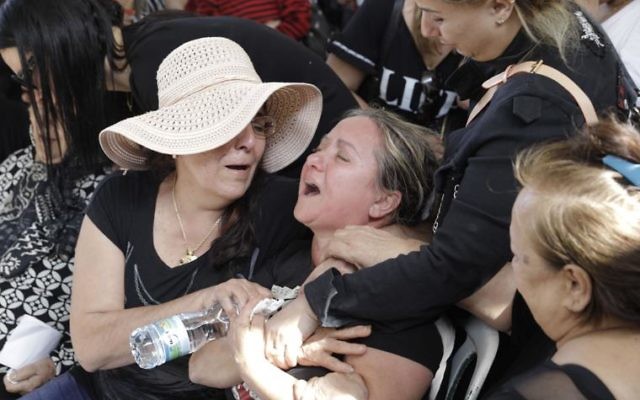‘There’ll always be a hole in our hearts’
THE rockets have stopped, but the tears continue.

THE rockets have stopped, but the tears continue.
The 13-year-old girl sitting next to me on Tuesday morning should have been at school.
Instead, she was sitting shiva for her father Moshe Agadi, killed on Saturday a couple of miles away, by shrapnel from a terrorist rocket.
In front of me, two of Agadi’s sisters told me of the grief that is overtaking their large family.
“People in Israel are returning to routine, but for us, there’ll always be a hole in our hearts,” said Janet Tverya.
Their mother wasn’t there. “She was hospitalised yesterday after an episode with her brain,” reported Tverya.
“Of course, it was because of what happened, because of the pressure.”
In three other homes across Israel, there were similarly tragic scenes.
Iris Eden, the widow of Moshe Feder, 68, was experiencing an unimaginable deja vu. An anti-tank missile hit his car near Sderot on Sunday. Her first husband, an Israeli Air Force pilot, died in a helicopter disaster in 1997.
There was also an eerie sense of history repeating itself at the shiva for Pinchas Menachem Prezuazman, 21, who was killed running for cover in Ashdod. His mother lost her brother in a 2002 bus bombing in Meron.
Ziad Alhamamda, 47, was working in an Ashkelon factory, and his death plunged the Bedouin-Arab community into mourning.
President Reuven Rivlin spent the week paying shiva calls, and stressing that terror targets all Israelis indiscriminately, Jews and Arabs of every religious and political outlook.
“Terror strikes us all without discrimination and without mercy and we will never surrender to it,” he said at the home of Alhamamda in the Bedouin town of Shaqib al-Salam.
He said: “I do everything I can to visit all Israelis who are in such terrible grief from terrorist attacks. We, the tribes of Israel, are together in good times and bad, in hope and in difficulty, regardless of which tribe we are from.”
Moments before I sat with Agadi’s family, I stood at the spot where he died. His was the first Israeli death of the clashes – and it was strange to see such a significant site still and silent, apart from two workmen boarding up a window.
The scene gave an indication of the force with which the lethal shrapnel fell. There was rubble on the ground, and collapsed concrete. It was a terrifying and lonely end for Agadi, a 58-year-old father-of-four who was known as sociable and caring. His sister Cheli Mualem said: “He was always smiling and always bringing joy to others, and many people have come to the shiva and told us of charitable donations he made quietly.”
As well as four bereaved families, there are more than 100 families in Israel helping loved ones to deal with new injuries as a result of the rocket fire – in eight cases with serious injuries. Many residents of the south have enlisted help for shock or trauma.
What unites all the families coping with loss, trauma and injury is their sense of bewilderment, and attempts to make sense of what happened to them. In Jerusalem, at the funeral of Prezuazman, his father Haim Dov said he had been “privileged” to bring him up and added: “I don’t understand why this is happening, but I am sure that you have fulfilled your purpose on this earth.”
NATHAN JEFFAY

comments